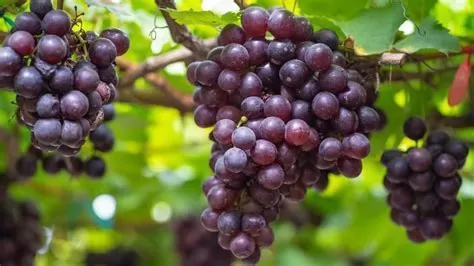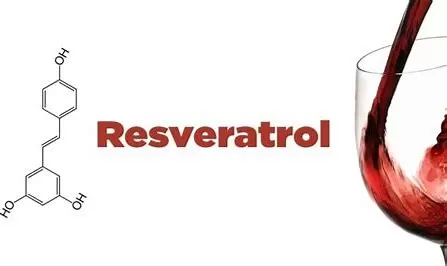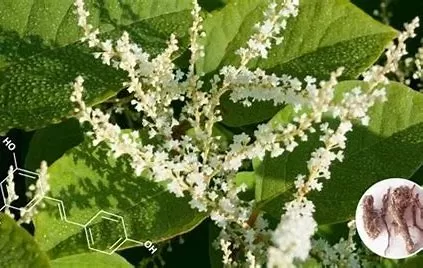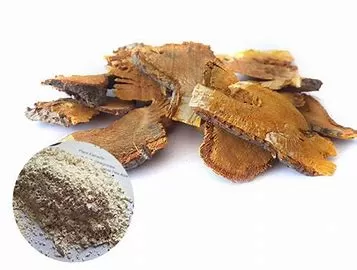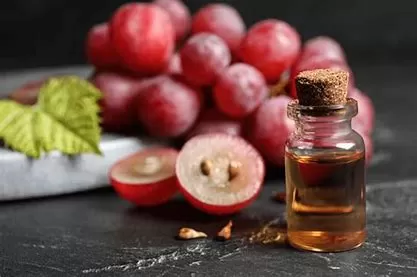- 0086-571-85302990
- sales@greenskybio.com
What Are the Sources of Resveratrol?
2025-03-18
Resveratrol, a natural polyphenol compound, has gained widespread attention in recent years due to its potential health benefits, particularly its antioxidant, anti-inflammatory, and anti-aging properties. Found naturally in certain plants, resveratrol is believed to help combat oxidative stress, reduce the risk of chronic diseases, and support overall wellness. As research into this compound continues to evolve, people are increasingly interested in finding foods, beverages, and supplements rich in resveratrol. In this article, we will delve into the main sources of resveratrol, why this compound is significant, and how one can incorporate it into a balanced diet.
Understanding Resveratrol
Resveratrol is classified as a stilbenoid, a type of naturally occurring phenol that plants produce as part of their defense mechanism. Plants synthesize resveratrol in response to stress, such as infection, UV radiation, injury, or disease. This compound has potent antioxidant properties, which allow it to neutralize harmful free radicals, thereby protecting cells from damage and reducing inflammation. Because oxidative stress plays a major role in the development of various diseases, including cardiovascular disorders, diabetes, neurodegenerative conditions, and even cancer, resveratrol has become a focus of scientific research.
Resveratrol is especially appealing for its potential to influence longevity and aging-related conditions. Studies have shown that resveratrol activates certain proteins, such as sirtuins, which are associated with cellular health, longevity, and DNA repair. These findings have led to resveratrol being dubbed a "longevity molecule" in some circles.
Given resveratrol’s significant role in promoting health, discovering its natural sources is crucial for anyone wishing to take advantage of its benefits.
Natural Food Sources of Resveratrol
Resveratrol can be found in various foods, primarily plant-based ones. Below are rich sources of this compound, as well as insights into their nutritional profiles.
Grapes
Grapes, particularly red and purple varieties, are one of the most famous sources of resveratrol. The compound is concentrated in the skins of grapes, as well as in the seeds and stems. Since resveratrol is produced by plants to protect them against environmental stress, grapes grown in adverse conditions may contain higher levels of the compound.
Both raw grapes and grape-derived products, such as grape juice and wine, are rich in resveratrol. Red wine is especially notable because its fermentation process enhances the concentration of resveratrol compared to other grape-based products. This is one reason why moderate red wine consumption has been linked to heart health in studies. It's worth noting that while resveratrol is prized in red wine, alcohol should be consumed responsibly and in moderation.
Peanuts
Peanuts, a popular nut consumed raw, roasted, or as peanut butter, are another notable source of resveratrol. While the levels of resveratrol found in peanuts are lower than those in grapes or wine, peanuts are still a convenient option for incorporating this antioxidant into your diet. Resveratrol is primarily concentrated in the skin of peanuts, so opting for unpeeled varieties provides greater nutritional benefits.
Peanut products such as peanut oil, roasted peanuts, and peanut butter also contain trace amounts of resveratrol, albeit at reduced levels compared to raw peanuts. For those who enjoy nuts as a snack or an ingredient in recipes, peanuts offer a simple way to include resveratrol in everyday meals.
Berries
Certain berries contain resveratrol, with blueberries and cranberries being the most prominent sources. These fruits are already celebrated for their high levels of other antioxidants, like vitamin C and anthocyanins, making them excellent choices for promoting overall health.
Blueberries, often referred to as a superfood, are particularly noteworthy for their broad range of antioxidant properties, offering benefits for brain health and vision in addition to their resveratrol content. Cranberries, widely consumed as juice or dried, also support heart health and immunity thanks to their antioxidants.
Mulberries
Mulberries are a lesser-known but potent source of resveratrol. These small, sweet, and colorful fruits provide not only resveratrol but also vitamins and minerals that contribute to their high nutritional value. As with grapes, much of the resveratrol content in mulberries is concentrated in their skins.
Mulberries are often consumed fresh or dried, and they can also be found in jams, juices, or syrups. Including mulberries in your diet not only provides a rich source of resveratrol but also contributes to a diverse nutritional profile.
Cocoa and Dark Chocolate
Cocoa and high-quality dark chocolate are indulgent and healthful sources of resveratrol. Dark chocolate, particularly those varieties with higher cocoa content (ideally 70% or more), contains resveratrol along with flavonoids and other beneficial antioxidants.
Cocoa powder, used for baking or drinks, also contains small amounts of resveratrol. Choosing unsweetened cocoa products and minimally processed dark chocolate ensures greater health benefits while avoiding excessive sugar intake.
Pistachios
Pistachios, another popular nut, are an additional source of resveratrol. These nuts are rich in healthy fats, fiber, and other nutrients, making them an excellent snack choice for those aiming to incorporate healthier options into their diets.
Similar to peanuts, consuming pistachios with their skins intact may enhance resveratrol intake. They are also versatile, easily integrated into meals, desserts, and even savory dishes.
Japanese Knotweed
Japanese knotweed deserves special mention because it is one of the densest sources of resveratrol. This plant often grows as a weed but is commonly used in herbal medicine, especially in dietary supplements. Japanese knotweed contains trans-resveratrol, which is the biologically active form of the compound.
Due to its exceptionally high concentrations of resveratrol, knotweed extract is often used in commercial resveratrol supplements. This makes it an effective option for those seeking a more concentrated dose of resveratrol that may be harder to achieve through food consumption alone.
Beverages and Other Products Containing Resveratrol
Resveratrol is also present in certain beverages and processed foods, albeit at varying levels depending on production methods and processing.
Red Wine: Perhaps the most famous and widely discussed source of resveratrol, red wine contains higher levels of resveratrol than white wine due to its fermentation with grape skins. However, moderation is key, as excessive alcohol consumption can negate the potential health benefits.
Grape Juice: For those who prefer to avoid alcohol, 100% grape juice offers a healthier alternative with the added benefit of resveratrol.
Dark Beer: Some studies suggest that darker beers may contain trace amounts of resveratrol, although it's far lower compared to grape-based products.
Resveratrol Supplements: For individuals seeking a concentrated dose or struggling to include resveratrol-rich foods in their diet, supplements derived from sources like Japanese knotweed or grape extracts are widely available.
Factors Affecting Resveratrol Levels
The concentration of resveratrol in foods and beverages can vary significantly due to several factors:
Environmental Stress: Plants produce higher levels of resveratrol when exposed to stress factors like UV radiation or fungal infection.
Processing Methods: Methods of food and beverage preparation can influence resveratrol levels. For instance, red wine and grape products made using traditional fermentation processes contain more resveratrol than modern varieties that limit skin contact.
Varieties of Produce: The specific type of grapes, peanuts, berries, or nuts can affect the concentration of resveratrol.
Conclusion
Resveratrol is a remarkable antioxidant with proven health benefits, from reducing inflammation and oxidative stress to supporting heart health, brain function, and longevity. While grapes and red wine remain the most celebrated sources, this compound can also be found in peanuts, berries, mulberries, cocoa, pistachios, and even Japanese knotweed. Drinking grape juice or consuming foods like dark chocolate and nuts offers enjoyable ways to incorporate resveratrol into a balanced diet.
For individuals seeking higher concentrations, resveratrol supplements derived from dense sources such as Japanese knotweed are a viable option. Whether included through natural foods, beverages, or supplements, resveratrol serves as a valuable addition to a healthy lifestyle, aiding in disease prevention and health optimization. By embracing diverse sources of resveratrol, you can harness the full potential of this powerful compound to support your long-term well-being.
- ▶ Hesperidin
- ▶ citrus bioflavonoids
- ▶ plant extract
- ▶ lycopene
- ▶ Diosmin
- ▶ Grape seed extract
- ▶ Sea buckthorn Juice Powder
- ▶ Beetroot powder
- ▶ Hops Extract
- ▶ Artichoke Extract
- ▶ Reishi mushroom extract
- ▶ Astaxanthin
- ▶ Green Tea Extract
- ▶ Curcumin Extract
- ▶ Horse Chestnut Extract
- ▶ Other Problems
- ▶ Boswellia Serrata Extract
- ▶ Resveratrol Extract
- ▶ Marigold Extract
- ▶ Grape Leaf Extract
- ▶ blog3
- ▶ blog4
- ▶ blog5
-
What fruit is highest in resveratrol?
2025-03-18
-
Is resveratrol safe for kidneys?
2025-03-18
-
Is It Okay to Take Resveratrol Every Day?
2025-03-18
-
What is resveratrol used for in skin?
2025-03-18
-
What Is Resveratrol Extract Good For?
2025-03-18
-
Artichoke Leaf Extract
2025-03-18
-
Coix Seed Extract
2025-03-18
-
Motherwort Extract
2025-03-18
-
Peppermint Oil
2025-03-18
-
Thunder God Vine Extract
2025-03-18
-
Moringa powder
2025-03-18
-
Boswellia Serrata Extract
2025-03-18
-
Quercetin
2025-03-18
-
Black Garlic Extract
2025-03-18
-
Grapefruit Seed Extract Powder
2025-03-18











